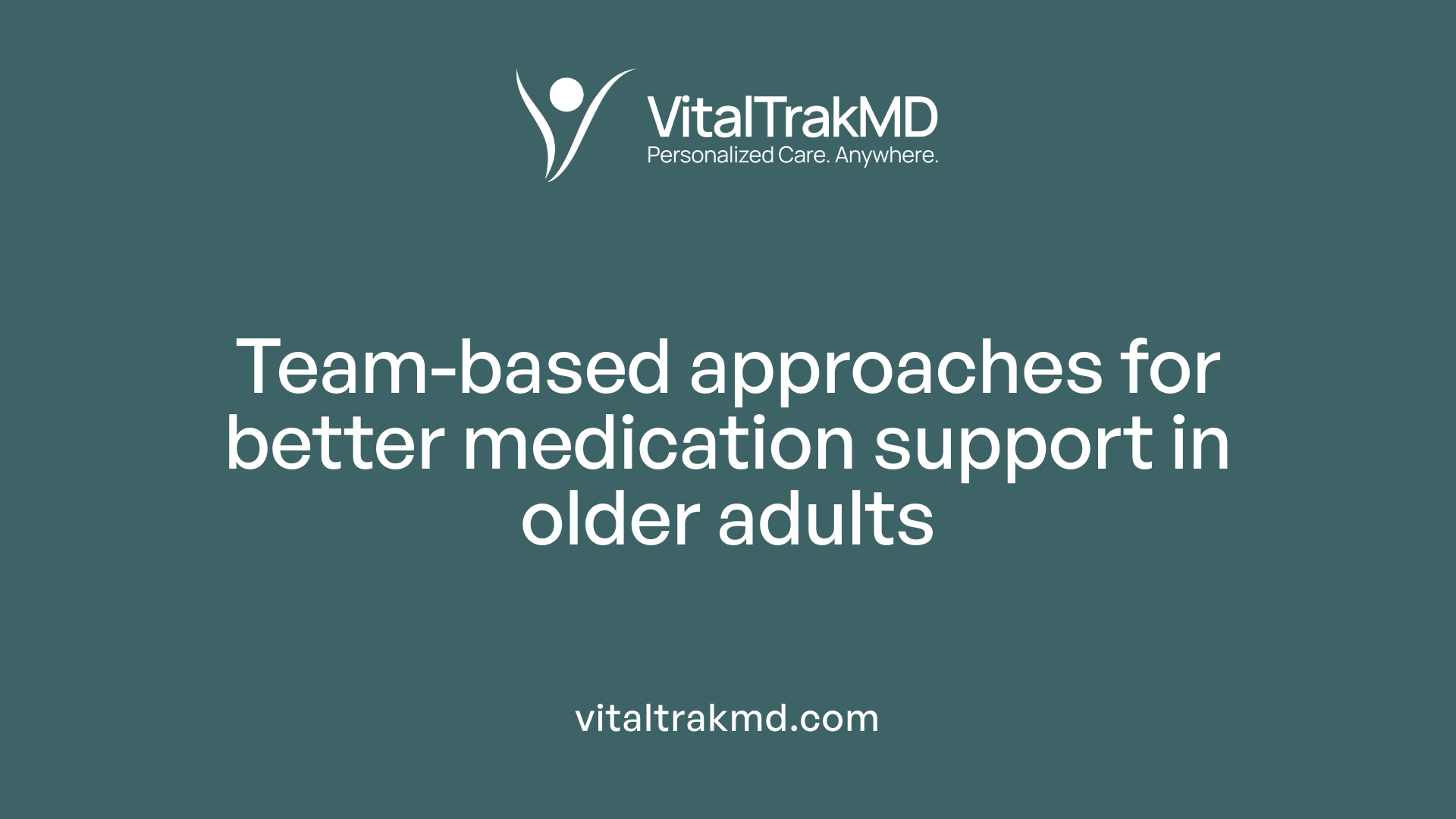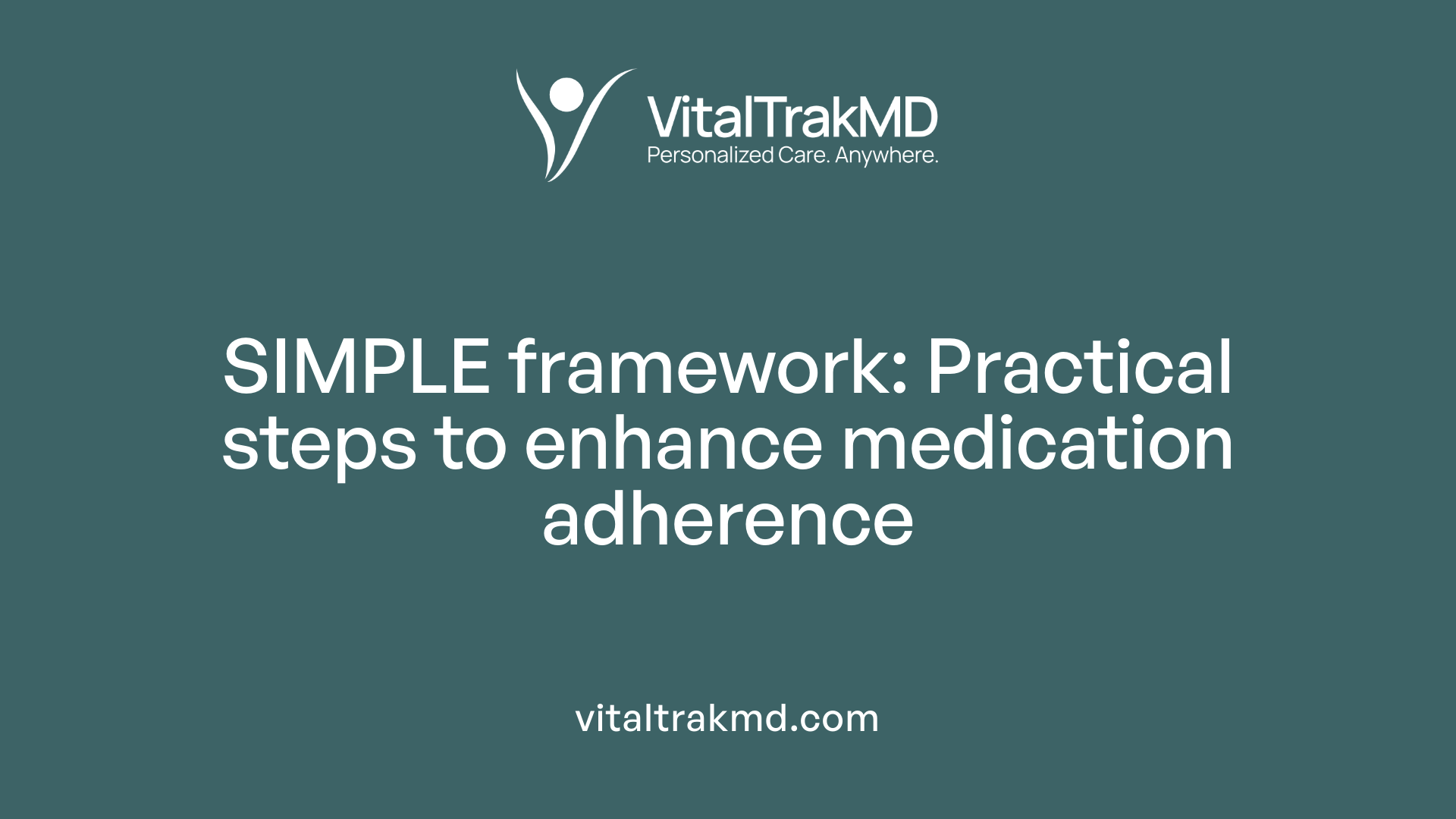Supporting Seniors With Practical Solutions for Medication Adherence

The Critical Importance of Medication Adherence Among Seniors
Medication adherence among older adults is a pressing health concern with profound implications for individual wellness and healthcare systems. With nearly half of seniors struggling to follow medication regimens consistently, both health outcomes and costs are adversely affected. This article explores evidence-based, practical solutions tailored to support seniors in managing their medications effectively, emphasizing the integration of personalized care, education, and streamlined medication management.
Understanding Medication Adherence Challenges in Older Adults

How prevalent is medication non-adherence among seniors?
Medication non-adherence affects up to 50% of older adults, posing a major challenge to effective healthcare for this population. Nearly half of seniors struggle to consistently take prescribed medications as directed, which can hinder disease management and increase risks.
What roles do polypharmacy and physiological changes play?
Polypharmacy, defined as taking five or more medications daily, is common in nearly 40% of seniors. This complexity increases the potential for adverse drug interactions, side effects, and confusion. Age-related changes, such as declining kidney and liver function, alter drug metabolism, increasing the risk of complications from medications.
Which cognitive, physical, and financial barriers affect medication adherence?
Cognitive decline, including memory problems, vision impairments, and reduced dexterity, can lead to missed doses or improper use of medications. Financial limitations also impact adherence, as older adults managing multiple drugs may skip medications due to cost. Furthermore, feelings of shame or mistrust and lack of understanding about diagnoses and treatment can be significant patient-related barriers.
What are the consequences of poor medication adherence?
Nonadherence in older adults contributes to costly health outcomes such as poor disease control, unnecessary hospitalizations, emergency department visits, and increased mortality. It also leads to therapy escalation and added burden on healthcare providers. These outcomes underscore the importance of addressing the multifaceted challenges to optimize health and reduce healthcare costs for seniors.
The Role of Patient-Centered Care in Improving Medication Adherence

Reframing adherence as collaboration rather than compliance
Viewing medication adherence as a collaborative partnership between patients and healthcare providers helps shift the focus from mere compliance to active patient engagement. This reframing encourages seniors to participate more meaningfully in their treatment plans, fostering trust and shared responsibility.
Shared decision-making and motivational interviewing techniques
Incorporating shared decision-making enables patients to voice their preferences and concerns, allowing tailored medication plans that align with their values and lifestyles. Motivational interviewing further supports this by exploring and resolving ambivalence around medication use, which can improve adherence through enhanced motivation.
Creating shame-free environments and open communication
Establishing a blame-free atmosphere is crucial to encourage honest discussions about medication challenges. Techniques such as "brown bag" reviews, where patients bring all medications for reconciliation, normalize the conversation about missed doses or difficulties. Asking nonjudgmental questions like "How often do you miss taking your medications?" helps uncover barriers without inducing shame.
The impact of patient beliefs and health literacy on adherence
Patient beliefs about medications significantly influence adherence. Misconceptions and fears, including nocebo effects, can deter proper medication use. Enhancing health literacy through education about medication purpose, side effects, and management equips older adults to make informed decisions and reduces negative perceptions that hinder adherence.
Pharmacist-Led and Team-Based Interventions to Support Seniors

How effective are pharmacist counseling and follow-up for medication adherence in seniors?
Pharmacist-led interventions, which often include personalized counseling and regular follow-up, have shown promising results in improving medication adherence among older adults. These approaches help clarify medication purposes, manage side effects, and tailor regimens to individual needs, thereby boosting quality of life and reducing hospitalizations. However, the effectiveness depends greatly on how well these programs are implemented and their duration — longer and consistent engagement tends to yield better adherence outcomes.
What benefits arise from involving a multidisciplinary team including care coordinators and social workers?
A team-based approach expands support for seniors beyond pharmacists, incorporating care coordinators, social workers, and other healthcare professionals. This collaboration addresses not only medication management but also social determinants of health, cognitive challenges, and financial barriers that patients may face. Such comprehensive care enhances medication safety and adherence by providing coordinated communication among providers and addressing complex patient needs.
Why is medication reconciliation important in these interventions?
Regular medication reconciliation plays a critical role in reducing duplication, detecting potentially harmful drug interactions, and aligning prescriptions from multiple providers. This process ensures that seniors' medication lists are accurate and up to date, which is particularly crucial given the common occurrence of polypharmacy and multiple prescribers in this population. Effective reconciliation helps avoid adverse events and supports simplified, safer regimens.
What should be considered when implementing pharmacist-led programs?
For pharmacist-led programs to succeed, proper implementation strategies matter. These include establishing clear follow-up schedules, integrating patient-centered communication techniques, and partnering with other members of the healthcare team. Program duration should be sufficient to sustain adherence improvements, often requiring ongoing engagement rather than short-term interventions. Tailoring interventions to target individuals with known adherence challenges also increases effectiveness.
| Intervention Aspect | Description | Impact Details |
|---|---|---|
| Pharmacist Counseling and Follow-Up | Personalized education and support with scheduled check-ins | Improves adherence, reduces hospitalizations |
| Multidisciplinary Teams | Inclusion of social workers, care coordinators, pharmacists | Addresses broader barriers, supports holistic care |
| Medication Reconciliation | Regular review and updating of medication lists | Prevents duplication, reduces adverse drug interactions |
| Implementation and Duration | Focus on sustained, well-structured programs targeting nonadherent seniors | Enhances long-term adherence and health outcomes |
Behavioral and Educational Programs Enhancing Medication Management
Evidence on the effectiveness of behavioral and educational interventions
Behavioral and educational programs have demonstrated moderate certainty evidence in improving medication adherence among older adults with chronic conditions such as coronary artery disease. Improvements have been observed from two to six months post-intervention and potentially extend beyond six months, contributing to better disease understanding and management capacity, as well as possibly reducing adverse clinical outcomes.
Key components: information provision, skills training, self-management, psychological support
Successful educational interventions typically include comprehensive information provision about medications and the underlying health conditions. Skills training enables older adults to manage complex regimens, while self-management strategies promote autonomy in medication use. Psychological support helps address beliefs and emotional barriers, fostering sustained adherence.
Utilization of theoretical frameworks in program design
Incorporating theoretical frameworks into the design of these programs ensures they effectively address the multifaceted needs and challenges faced by older adults. Frameworks guide the development of refined components tailored to complex health needs, optimizing intervention impact.
Formats including face-to-face and mobile health (mHealth) delivery
Delivery methods vary and include both face-to-face sessions and mHealth approaches such as telephone calls and text messaging. These formats increase accessibility and convenience, helping reinforce adherence behaviors outside clinical settings.
Family involvement in supporting adherence
Engaging family members in educational programs adds an important layer of support. Family involvement can enhance understanding, assist with regimen management, and encourage consistent medication use among older adults.
| Topic | Details | Benefits |
|---|---|---|
| Effectiveness Evidence | Moderate certainty for adherence improvement up to 6+ months | Enhanced disease control and reduced adverse outcomes |
| Core Components | Information, skills training, self-management, psychological support | Addresses knowledge gaps and emotional barriers |
| Theoretical Frameworks | Guides program design to address complex health and behavioral needs | Increases intervention precision and effectiveness |
| Delivery Formats | Face-to-face, telephone, text messaging (mHealth) | Expands accessibility, supports continuous engagement |
| Family Involvement | Inclusion of family members in education and support | Strengthens support network, improves regimen adherence |
Simplifying Medication Regimens to Promote Adherence
What Strategies Help Simplify Medication Regimens?
Simplifying medication regimens can greatly improve adherence among older adults. One effective approach is deprescribing, which involves carefully reducing or stopping medications that may no longer be necessary or that pose risks. This helps minimize polypharmacy—the concurrent use of five or more medications—a common issue affecting nearly 40% of seniors.
Another strategy is the consolidation of dosing schedules. By aligning medication times, patients face fewer interruptions throughout the day, increasing the likelihood they take medications as prescribed. Healthcare providers often recommend synchronized prescriptions, where repeat medications are refilled together on the same schedule, reducing pharmacy visits and confusion.
How Do Combination and Extended-Release Formulations Aid Adherence?
Using combination pills, which include multiple medications in one tablet, streamlines regimens while decreasing pill burden. Similarly, extended-release formulations reduce dosing frequency by maintaining therapeutic drug levels over longer periods, making medication routines less disruptive.
What Tools Support Simplification and Adherence?
Practical tools such as pill organizers help seniors manage complex medication schedules, especially those experiencing cognitive or dexterity challenges. These organizers visually separate doses by day and time, reducing missed or doubled doses.
Why Is Addressing Polypharmacy Risks Important?
Polypharmacy increases the risk of adverse drug interactions and side effects that may discourage medication adherence. Regular medication reconciliation by healthcare providers identifies unnecessary or conflicting medications and aligns treatments among multiple prescribers. This process not only reduces health risks but also improves patients’ confidence in managing their therapies.
By combining these strategies—deprescribing, dose consolidation, using advanced formulations, synchronized refills, and supportive tools—healthcare teams can reduce regimen complexity and promote sustained medication adherence in older adults.
Leveraging Technology to Support Medication Adherence in Seniors

How Do Electronic Prescribing and Integrated Electronic Health Records Enhance Medication Adherence?
Electronic prescribing (e-prescribing) and integrated electronic health records (EHRs) streamline the medication management process for seniors and their healthcare providers. These technologies reduce errors by improving communication across multiple prescribers, ensuring seniors receive accurate and consistent prescriptions without overlaps or conflicts. Integration helps with regular medication reconciliation, a crucial step that catches inconsistencies and prevents medication errors that might otherwise lead to poor adherence or adverse effects.
How Can Predictive Analytics Identify Seniors at Risk of Non-Adherence?
Predictive analytics utilize patient data to flag individuals at increased risk of medication non-adherence. By analyzing patterns such as prescription refills, health status, and social determinants, providers can proactively intervene with targeted support. This data-driven approach allows for early identification of barriers like cognitive decline or financial constraints, enabling personalized care plans and timely reminders.
What Role Do Medication Synchronization Tools and Reminder Systems Play?
Medication synchronization aligns refill schedules to minimize pharmacy visits, especially beneficial for those managing multiple prescriptions (polypharmacy). Meanwhile, reminder systems—including alarms, apps, and text message alerts—help address challenges stemming from memory issues, vision impairments, or complex regimens. These tools promote consistent medication intake through tailored prompts and simplify daily routines.
What Are the Benefits and Challenges of Using Technology in Older Adults?
Technology offers significant advantages such as improved safety, enhanced coordination, and empowerment through accessible medication information. However, barriers include varying levels of digital literacy, physical limitations like impaired vision or dexterity, and occasional resistance due to mistrust or unfamiliarity. To maximize effectiveness, technologies must be user-friendly and often require support from caregivers or healthcare teams to address these challenges.
| Technology Aspect | Benefits | Challenges and Considerations |
|---|---|---|
| Electronic Prescribing & EHRs | Reduces errors, enables coordination across providers | Requires interoperability and privacy safeguards |
| Predictive Analytics | Early identification of non-adherence risks | Dependent on data quality; may need patient consent |
| Medication Synchronization | Simplifies refill process, reduces pharmacy visits | Requires collaboration among pharmacies |
| Reminder Systems | Supports memory, compensates for physical limitations | Acceptance varies; may need customization |
Harnessing technology thoughtfully, alongside patient-centered support strategies, can significantly improve medication adherence and health outcomes among seniors.
Addressing Cognitive and Physical Limitations to Enhance Adherence
Impact of Cognitive Decline, Vision, and Dexterity Issues on Medication Management
Cognitive decline, vision impairment, and reduced dexterity are common challenges among older adults that significantly affect their ability to manage medications correctly. These limitations can lead to missed doses, incorrect usage, or medication misuse, further complicating health outcomes.
Use of Caregivers and Support for Cognitively Impaired Seniors
Involving caregivers is crucial for seniors experiencing cognitive difficulties. Caregivers can assist in organizing medications, providing reminders, and ensuring adherence, which helps in reducing errors and improving health.
Tailored Strategies Such as Reminders and Medication Lists
Utilizing personalized tools like pill organizers, medication lists, and reminder systems supports patients facing memory or attention challenges. These strategies increase structure and accountability, making adherence more manageable.
Importance of Simplifying Instructions and Accommodating Physical Challenges
Simplifying medication regimens by combining doses, using extended-release formulations, and providing clear, easily understandable instructions can relieve cognitive load. Accommodating physical limitations by using easy-to-open packaging or dosing aids further enhances medication management.
Together, these approaches foster a patient-centered environment that addresses the specific cognitive and physical barriers faced by elderly patients, ultimately promoting safer and more effective medication adherence.
Practical Strategies and Frameworks for Sustained Medication Adherence

What is the SIMPLE medication adherence framework?
The SIMPLE framework offers a structured method to enhance medication adherence among older adults. It stands for:
- Simplify: Reduce regimen complexity by minimizing polypharmacy, consolidating dosing schedules, and using combination or extended-release pills.
- Impart knowledge: Educate patients about their medications’ purposes, side effects, and management.
- Modify beliefs: Address patient misconceptions and the nocebo effect to reduce false negative side-effect perceptions.
- Provide trust: Establish a shame- and blame-free environment fostering honest patient-provider communication.
- Leave biases: Avoid assumptions about adherence and create patient-centered care plans.
- Evaluate: Regularly review medications, adherence, and health outcomes through follow-up.
Why is addressing misconceptions and the nocebo effect crucial?
Misconceptions about medication can result in unwarranted fears and missed doses. Addressing these through education helps alleviate false negative side effects that often arise from the nocebo effect. This approach builds confidence and encourages patients to adhere to their prescribed treatments.
How can the teach-back method and personalized medication lists support adherence?
Using the teach-back method involves asking patients to explain how they will take their medications, ensuring understanding. When paired with updated, personalized medication lists, it empowers patients to manage their regimens safely. These tools help clarify instructions, improve health literacy, and support self-management.
What role does building structure and accountability play?
Providing reminders, pill organizers, and scheduling regular medication reviews enhances accountability. Follow-up consultations, pharmacist-led counseling, and integrating caregivers help monitor adherence. These structured supports can offset barriers like cognitive decline or physical limitations, making medication regimens easier to follow over time.
Empowering Seniors Through Integrated and Compassionate Medication Support
Supporting seniors in medication adherence demands a multifaceted approach blending personalized education, streamlined regimens, and collaborative care. By addressing the unique physiological, cognitive, and social challenges faced by older adults, healthcare providers can foster trust and engagement, ultimately improving health outcomes and quality of life. Embracing innovative interventions and creating supportive environments will be key to helping seniors manage their medications successfully and sustain their wellness over time.
References
Recent articles
Want to Feel Better and Live Healthier?
Join hundreds of patients taking control of their health with personalized care that fits their life – not the other way around.
Rated 4.8/5 by 32+ customers







